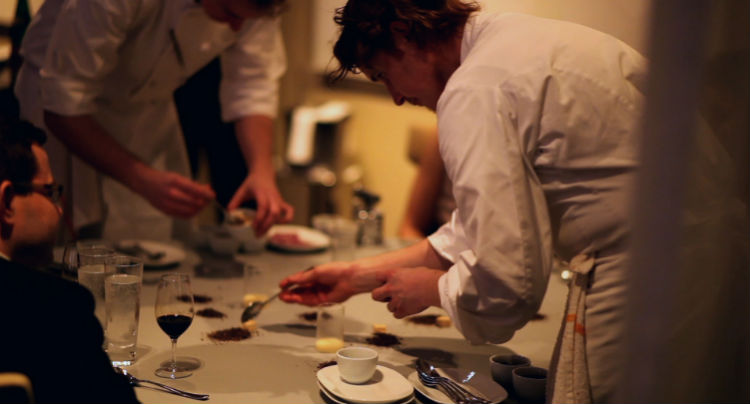
Its truly fascinating subjects and their moving stories will send you home happy.

Its truly fascinating subjects and their moving stories will send you home happy.
In Spinning Plates, a documentary for both rabid foodies and casual diners alike, we follow the stories of three restaurants, each operating in distant corners of the dining world, as their owners guide us to the the roots of their gastronomic passion. From the best fine dining restaurant in the country, to a town watering hole, to a floundering mom-and-pop shop, the film’s narrative range is wide. Wide, but dissonant; the profiles of the restaurants and their respective restauranteurs feel episodic and noticeably unrelated, made more obvious by director Joseph Levy making a too-little-too-late attempt to weave the story lines together in the film’s final minutes. Still, the three stories are dazzling on their own, with genuine moments of love, devotion, compassion, and struggle. Oh, and food porn. Lots of food porn.
Stealing the show like a filet mignon at McDonalds is celebrity chef Grant Achatz, executive chef at Alinea–a Three-Michelin-Star restaurant in Chicago and widely regarded as the best fine-dining establishment in the country. Achatz’s mad-cap, Wonka-like inventiveness with all things edible was key in earning Alinea its sterling reputation; from infusing food with the flavor of tobacco, to splattering a Pollock-esque kaleidoscope of sweet components across a table (no plates needed) for dessert, his imagination is seemingly endless. He’s a fascinating talker, and he and his fantastical food concoctions could cary a film on their own (one can dream), but Levy delves into the emotional recent history of the madman chef.
In his prime, just when his career was reaching unimaginable heights, Achatz was diagnosed with stage 4 tongue cancer, which, as you could imagine, would dismantle everything he’d worked so hard for. He eventually lost his sense of taste, and was all but ready to bid the kitchen farewell. Then, with help from his friend and business partner, Nick Kokonas, he found doctors who used alternative, experimental treatments and medicines to send the cancer into remission, miraculously allowing Achatz to get back to his life’s work. And back to work he went. Still, the cancer could return; the chef lifestyle shaves years off of your life, and Achatz admits he probably should give it up for the sake of his health and family (wife, two sons), but he’s chosen to go out fighting. Kudos to Levy for plunging into Achatz’s story from this angle, and with such finesse–the chef’s candor is thoroughly riveting.

Less riveting but more heartwarming is the story of Balltown Iowa’s Brietbach’s Country Dining, which is technically owned by Cindy and Mike Brietbach, humble, hard-working business owners. I say technically because the restaurant truly belongs to all the fine folks of Balltown; it’s the type of joint that has regulars that are so regular they have their own keys! When the restaurant tragically burned down, people from miles around pitched in and helped the Brietbachs rebuild out of love for their favorite social grub spot. When it burned down again, the community’s outreach of support was no less emphatic.
With Alinea serving people on a worldwide stage, and Brietbach’s feeding its faithful followers on a smaller stage, the third restaurant, Gabby’s, operates on the smallest stage of all, as it struggles to draw customers. Francisco Martinez’s opened the family-run Mexican restaurant as a gift and loving tribute to his wife, who the establishment is named after. They’re a happy couple; family members work in the restaurant for free, and they love bringing their toddler daughter to work, passing on to her their family culinary traditions. But as the reality sets in that they could lose their home due to the restaurant’s dwindling business, Gabby breaks down on camera. “I don’t want to lose my house!” she wails, as Francisco desperately clings on to hope as he watches his wife weep in disbelief.
Most, if not all, of the food glamour-shots belong to Achatz, as the food at the other two restaurants are less visually arresting. Levy cuts between the three stories seemingly arbitrarily, running them parallel as opposed to intertwined by theme or symbolism. It isn’t a bad narrative approach, per sé, but it doesn’t generate any sort of movement or momentum. Achatz makes an intriguing assertion that all types of restaurants, from Michelin Star marvels to hole-in-the-wall eateries, strive toward the same goal. But, really, it’s just sentimental way of saying that their primary commonality is that they serve food to people. Spinning Plates can sometimes feel like it’s spinning its wheels, but its truly fascinating subjects and their moving stories will send you home happy (and hungry.)